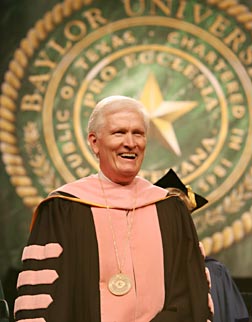IMB isolationism contrary to missions trend, experts say
Posted: 4/28/06
IMB isolationism contrary
to missions trend, experts say
By Ken Camp
Managing Editor
DALLAS—At a time when collaboration and cooperation characterize Christian missions, the Southern Baptist International Mission Board appears to be moving toward isolation and exclusion, some veteran missionaries and missiologists insist.
They point to IMB policies that prohibit private charismatic practices, narrow the parameters for acceptable baptism and require that church-starts meet a stringent definition of “Baptist” as indicators of a trend that runs contrary to the direction of most Christian missions enterprises.
“Yes, there is definitely a trend toward ecclesiastical exclusiveness, doctrinally and missiologically, in our SBC and IMB philosophies and strategies,” said Justice Anderson, who served as a missionary-professor 16 years at the International Baptist Seminary in Buenos Aires, Argentina, and 26 years as professor of missiology at Southwestern Baptist Theological Seminary in Fort Worth.
| Volunteers with Hungarian Baptist Aid and Baptist World Aid respond following the tsunami that hit South Asia. While Southern Baptist missionaries are allowed to cooperate in humanitarian relief, cooperation is restricted in church planting and theological education. |
Not so, said IMB spokesperson Wendy Norvelle, who quoted a board-approved basic operating principle: “Our basic role is to lead and facilitate the international missionary involvement of Southern Baptists in partnership with overseas Baptists and other Christians who are fulfilling the Great Commission.”
Norvelle pointed to ongoing partnerships with Wycliffe, Youth With A Mission and Campus Crusade as examples of IMB cooperation with non-Baptist Christians.
“We’re clearly working with many different people and groups representing a wide variety of Great Commission Christians,” Norvelle said. “It could be argued that our missionaries have been given more freedom to partner than ever before.”
But other missions practitioners point to different examples. For instance, the recent Ethne ’06 initiative in southeast Asia brought together about 350 Christian mission leaders from 50 countries to brainstorm, pray and develop collaborative strategies for sharing the gospel with the world’s least-reached people groups. Kent Parks of the Cooperative Baptist Fellowship worked as a facilitator for the event.
As the convening group and steering committee put the program together, many participants asked if the IMB would be involved, he recalled.
“Several invited the IMB people from their region to be involved. I made it a point to contact several IMB friends” known from his eight years with the Southern Baptist mission board, he said, emphasizing to them it was not “a CBF effort.”
No regional-level IMB representatives attended the event. The only IMB personnel who participated were two researchers involved in the discussion on collaboration in research, Parks noted.
Ironically, the IMB “New Directions” plan implemented by President Jerry Rankin—later renamed “Strategic Directions for the 21st Century”—emphasized strategic alliances with non-Baptist Great Commission Christians, though critics at the time noted it did not extend to alliances with the CBF.
The plan established a five-level system describing guidelines for strategic relationships. At the lowest level—gaining entry to the targeted population—a summary of the guidelines states: “Creativity and flexibility are essential in associating with cultural programs, educational institutions, business forums or whatever can open the door to deeper levels of relationships.”
Likewise, at the second level—prayer and ministry in response to needs—missionaries are encouraged to cooperate with other Christians.
At the third level—evangelism and Scripture distribution—the pool of potential partners “is greatly reduced to those whose commitment is to New Testament evangelism and who present personal repentance and faith in Jesus Christ as the only way of salvation.”
At the top two levels—church-planting and theological education—the scope of cooperation constricts significantly.
Church-planting must be done in accord with the 2000 Baptist Faith & Message and meet 10 guidelines that define a Baptist church for IMB purposes. Those guidelines include believers’ baptism by immersion, regular observance of the Lord’s Supper, autonomy and self-governance, submission to “the inerrant word of God as the ultimate authority,” commitment to the Great Commission and a male-only pastorate.
Regarding theological education, “doctrinal purity” is the stated goal in the IMB guidelines. “This is the level at which we are seeking to influence the ongoing shape of Baptist work and identity, even after the missionary is no longer present, through theological education and ministerial training,” a summary of the guidelines states. “Seldom, if ever, would we engage in strategic relationships, even with other Great Com-mission Christians, at this level, though we sometimes find ourselves with opportunities to relate to indigenous institutions in which others may already be working.”
The movement toward cooperation with non-Baptist Great Commission Christians began in the mid-1980s during Keith Parks’ tenure as president of the Southern Baptist Foreign Mission Board—predecessor to the IMB.
Trustees at the time “were increasingly uneasy about whether the doctrine of these groups was acceptable,” Parks recalled. “They never understood our conviction that the synergy created would bring more into the kingdom and produce more churches than going it alone.”
The IMB trustees’ concern about enforcing doctrinal purity led the board not only to restrict its collaboration with non-Baptist Christians but also with other Baptists, he added. “One of the great tragedies of this trend toward exclusiveness is the separation from local Baptists in countries where missionaries have been involved for years. It seems to me that there would be great merit in continuing the practice of seeking to influence and mobilize these millions of Baptists who have come from earlier Baptist witness,” he said.
“The impression I have gotten is the IMB assumes it can reach more people, alone, with the ‘right kind of gospel’ than could be reached through influencing millions of Baptists and mobilizing them.
“Once, Southern Baptists were a people cooperating in a missions commitment. Now, they are a people enforcing conformity around doctrine. … When ‘true doctrine’ enforced by a self-chosen few is the basis for cooperation, the circle will continue to grow smaller and smaller.”
Some veteran missionaries like Anderson see the change in direction at the IMB as the unraveling of a tapestry carefully woven by previous generations of missions workers.
“My generation of missionaries was urged to cooperate with other Great Commission entities and to integrate our work with national conventions and agencies. We worked hard to fuse our work into the national entities and to gradually turn over leadership to national leaders,” Anderson said. “This has all changed rather rapidly, historically speaking, but has been concomitant of the fundamentalist movement and an isolationist mentality of the SBC.”
Christianity is experiencing its greatest growth in Africa, Southeast Asia and Latin America, and Southern Baptists need to find ways to cooperate with other Christians in those areas and influence that missionary movement in healthy ways—not grow more insulated and isolated, he insisted.
“A reactionary exclusiveness—doctrinally, strategically and ecclesiastically—cuts us off from the exciting future of evangelical missions and growth in these areas,” Anderson said.
Bill Tinsley, leader of WorldconneX, a missions network launched by the Baptist General Convention of Texas, agreed cooperation and collaboration represent the wave of the future in missions.
“The larger trend is definitely toward increased collaboration and cooperation among evangelicals, especially as the Christian center shifts to the Southern Hemisphere and non-Western Christians take responsibility for world missions,” Tinsley said.
“If we would join God in what he is doing in the 21st century, we must work more closely with other Christian groups. God is mobilizing the entire body of Christ to redeem and transform the world.”
Albert Reyes, president of Baptist University of the Americas in San Antonio, underscored the same point.
“We are moving to a place in missions where collaboration is currency,” Reyes said. “Kingdom-advancing missional strategists look for ways of collaborating for the greater good. Baptist Christians in any mission field demonstrate wisdom when they collaborate with other kingdom Christians to accomplish more together than they could by themselves.”
Rob Sellers, missions professor at Hardin-Simmons University’s Logsdon Seminary, echoed that sentiment, saying partnership and cooperation are crucial for 21st century missions.
“The kingdom of God is not an American colony or outpost. The church in Africa will not, and should not, look like its counterpart in Nashville or Rich-mond or Dallas,” Sellers said.
“The task of sharing Good News is larger than any one mission agency can accomplish by itself. Cooperation makes wonderful sense, and although there may be a risk that our partners see things differently than we, the benefits of cooperation justify our trying to make it work.”
Overwhelming need—particularly to share the gospel with unreached people groups—motivates the movement toward collaboration in missions, said Mike Stroope, missions professor at Baylor University’s Truett Theological Seminary.
“The world of Christian missions is rushing toward collaboration and networking because of the overwhelming number of people who have yet to hear the gospel of Jesus Christ,” Stroope said.
“Most missionaries around the world see the absolute necessity of finding ways of combining resources and uniting forces in order that they might generate a greater and more effective witness and plant a great number of churches. Rather than busying themselves with drawing hard and fast denominational and organizational boundaries, they are looking for ways to get every believer into the harvest.
“There is too much to be done to compete or to exclude. The vision of millions of people without Jesus should compel Baptists to link arms with Great Commission brothers and sisters around the world so that they might do whatever it takes to make Jesus Christ known and to establish his church.”
News of religion, faith, missions, Bible study and Christian ministry among Texas Baptist churches, in the BGCT, the Southern Baptist Convention ( SBC ) and around the world.





